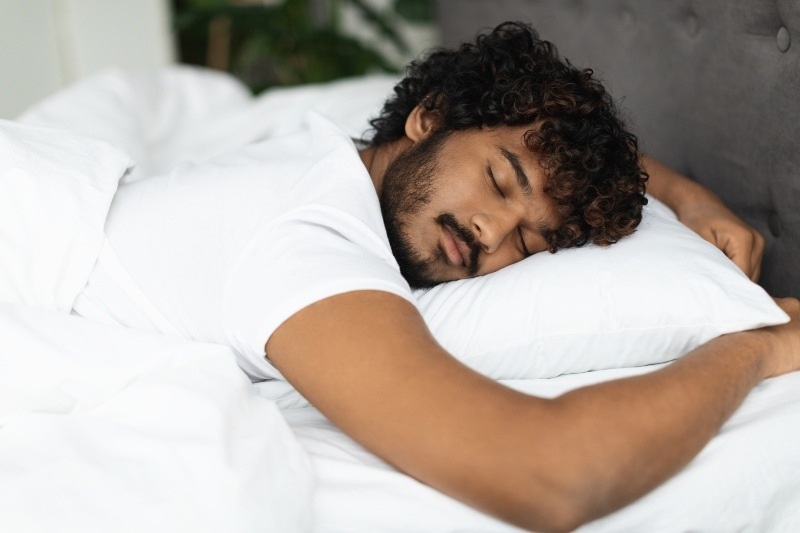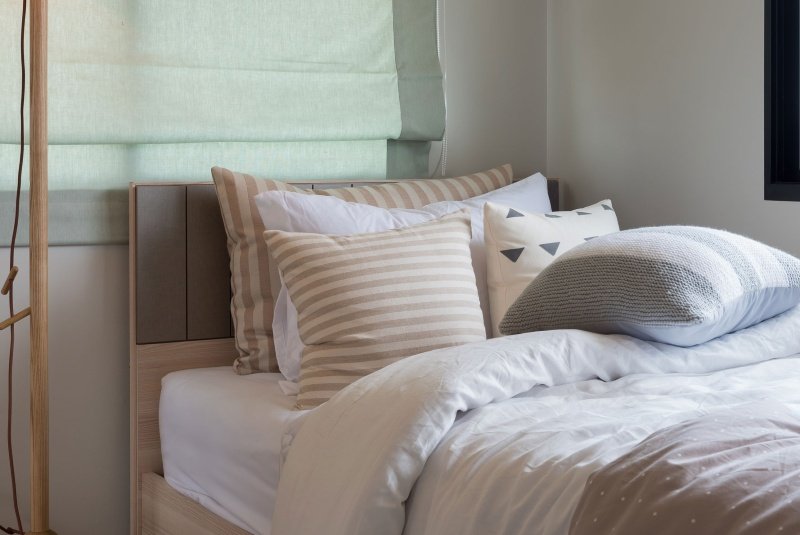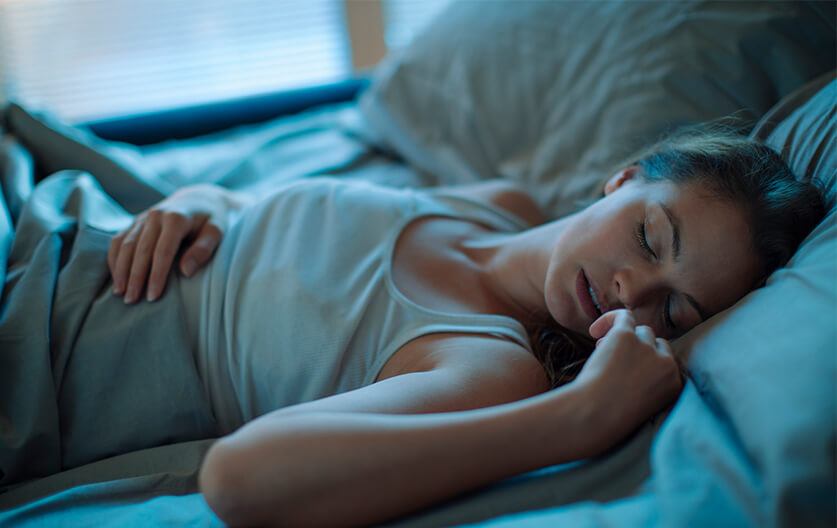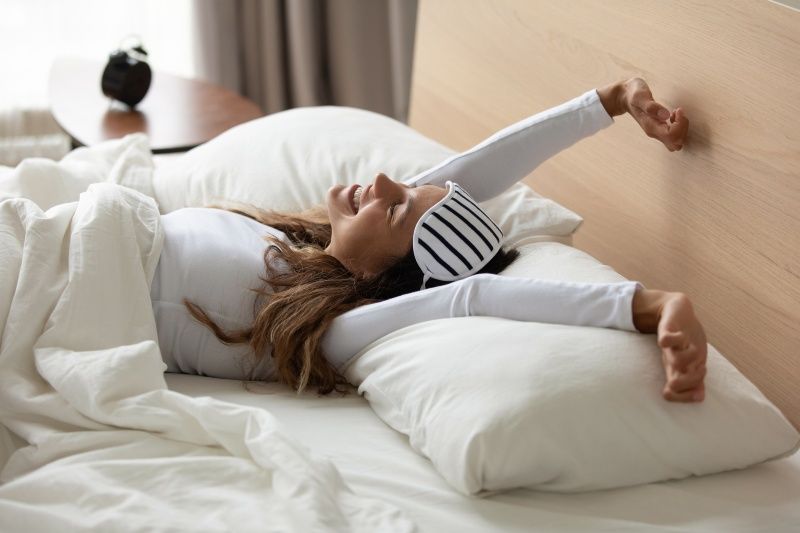- Home
- Mind & body
- Tips for getting a good night’s sleep
At CBHS we help you manage your health challenges. We believe in offering you the services, support and tools you need to live your best life.
Our Better Living Programs are available to support eligible members towards a healthier lifestyle. Each Better Living Program is subject to its own eligibility criteria.
Contact us for more information and to confirm your eligibility for a program.
Tips for getting a good night’s sleep

We all love a good, deep, uninterrupted sleep. But a surprising number of Australians don’t seem to be getting it. Around 40% of adults aren’t getting adequate sleep and it’s happening for a variety of reasons including:
- Weight issues
- Heartburn
- Bladder weakness
- Excess stimulant consumption like coffee
- Sleep disorders like insomnia.
What happens if you’re not sleeping well, regularly?
While late nights go hand in hand with living in the modern world, it’s not a good idea to make poor sleep a pattern. A lack of good quality sleep can affect you in the following ways:
- Low energy
- Brain fog
- Lack of concentration
- Irritability
- Mood swings (stress and anxiety)
- Poor decision making
- Bad memory and recall.
But here’s the good news: there are changes you can make to your lifestyle that can improve the quality and quantity of your sleep. In fact, one of the best things you can do is to improve your sleep hygiene.
What is sleep hygiene?
Sleep hygiene is a variety of different practices and habits that can help you get a good night’s sleep on a regular basis.
Tips on improving your sleep hygiene
There are three areas you can work on today to improve your sleep hygiene.
1. Improve your sleep environment
As tempting as it is to binge your favourite Netflix series in bed or install a giant TV on your bedroom wall, try and resist. Keep your bed for sleeping and unwinding at the end of a long day. But if you must return that call or email, think about taking care of all your admin in another room a couple of hours before bedtime.
2. Cool it down
Tossing and turning and working up a sweat as the mercury climbs isn’t ideal for a relaxing night’s sleep. Did you know the optimal temperature for sleeping is between 17 to 19C? During those hotter Aussie months, you might want to consider getting a small fan for your bedside or installing an air conditioning unit in your bedroom.
3. Invest in good quality, comfortable bedding.
It’s not about getting silk sheets and pillows (but feel free to bring a little luxury to your bed if you want to!). Quality bedding is based on having a comfortable mattress, a good quality pillow and enough warm bedding – cashmere blankets are optional but wonderful if you want to treat yourself!

4. Take care of your body
Try to eat several hours before you go to bed. Heavy or spicy foods can keep you up by increasing your body temperature, making your stomach feel uncomfortable, or cause a late-night bathroom trip. You should also avoid those late-night snack cravings.
Avoid stimulants four hours before going to bed. You may love a latte in the evening, but caffeinated beverages like coffee, tea, colas and soft drinks can keep you up instead of winding you down before bed.
Exercise daily, your body and mind will thank you! A tired body needs to sleep, and a great way to tire out your body is to break a sweat. But you don’t need to run ten kilometres to benefit from a deep night’s sleep. A yoga class with plenty of stretching and movement or even a light fitness routine earlier in the day can do the trick.
Get some sunlight, soak up those rays! Exposure to natural light during the day and darkness in the evening can help to maintain a healthy sleep-wake cycle. Even something as simple as a brisk walk with a friend on a sunny day, or sitting in the park with a good book is enough to give you a hit of sunshine.
Find a sleep routine that works for you and stick to it. If you can keep a good bedtime routine, you’ll find it easier to fall asleep at the same time each night.
5. Take care of your mind
Put away the devices – as hard as it can be! There’s no denying we’re living in an increasingly noisy and tech-heavy world. And unfortunately, sleep is a casualty of this growing need to ‘stay connected’ on our screens – particularly at night. Using electronic devices such as smartphones and laptops in the hour before bed can stimulate your mind and disrupt your natural sleep cycles.
Set aside time in the evening to think about your plans and possible solutions. Make a to-do list if it will help but try to keep the hour before your bed as your wind down time.
Don’t watch the time. Believe it or not, constantly checking the clock can increase your stress levels especially if you start counting the minutes you’re spending lying awake. Make sure you can’t see the time or access it easily.
“40% of Australians aren’t enjoying enough quality sleep because of issues such as weight gain, stress and stimulants like coffee.”

Keep track of your sleep – and what helps you unwind
If you can keep a record of the quality and quantity of your sleep, you may be able to work out what helps you get a good night’s rest so you can wake up feeling refreshed, reinvigorated and ready to face the world.
Is it meditation before bedtime? Or some sleeping music? Light bedclothes? A heavier blanket or doona? A little bit of trial and error in the beginning can set you up for a successfully soothing bedtime routine.
Still struggling to sleep well?
If you have long-term sleep issues, and regularly wake up tired, it might be time to speak with your doctor for further guidance and support.
It’s possible you may have a sleep disorder. In fact, there are a number of sleep disorders including insomnia, snoring and sleep apnoea. That’s why it’s a good idea to seek a professional medical opinion for your doctor. They may refer you to a sleep specialist or provide a diagnosis and appropriate treatment.
“Choose good quality bedding and a cool, dark and quiet bedroom for a better night’s sleep – and keep those devices at bay!”
The basics of sleep hygiene – at-a-glance
Consistency is key if you want to enjoy more regular and restorative sleep patterns.
- Go to bed at the same time every night
- Wake up at the same time each morning – and that includes weekends
- Keep your bedroom cool, dark and quiet – keep TVs or devices out!
- If you need to do something before sleep, try meditation
- Sleep on a good quality mattress and bedding.

Sleep is an essential part of a healthy lifestyle
Contrary to popular belief, sleep hygiene isn’t about washing your sheets regularly. Although falling asleep on fresh, clean sheets is a great addition to any bedtime routine! Keeping a regular bedtime, limiting caffeine and devices before bed are just a few of the things you can do to improve your sleep hygiene – and set yourself up for a more soothing snooze on a regular basis.
When you can get consistent, deep sleep each night, your body and mind get a chance to recharge properly so you can wake up energised, alert and ready for the day!
For more tips on sleeping well – every night – be sure to check out our sleep and fatigue section.
All information contained in this article is intended for general information purposes only. The information provided should not be relied upon as medical advice and does not supersede or replace a consultation with a suitably qualified healthcare professional.
Sources:
https://www.cbhs.com.au/mind-and-body/blog/how-to-slow-down-and-top-up-your-health-and-wellbeing
https://www.cbhs.com.au/mind-and-body/blog/embracing-the-natural-flow-of-life-with-meditation
Sleep Quality: How to Determine if You’re Getting Poor Sleep | Sleep Foundation
https://www.sleephealthfoundation.org.au/component/tags/tag/general-sleep-tips.html
Health and wellbeing
programs & support
You Belong to More with CBHS Hospital cover:
- Greater choice over your health options including who treats you
- Get care at home with Hospital Substitute Treatment program
- Free health and wellbeing programs to support your health challenges
Live your healthiest, happiest life with CBHS Extras cover:
- Benefits for proactive health checks e.g. bone density tests, eye screenings
- Keep up your care with telehealth and digital options
- Save on dental and optical with CBHS Choice Network providers
